Tue 9 May 2023
Nero Wolfe on Page and (Small U.S.) Screen: In the Best Families, by Matthew R. Bradley.
Posted by Steve under Reviews , TV mysteries[9] Comments
In the Best Families
by Matthew R. Bradley.
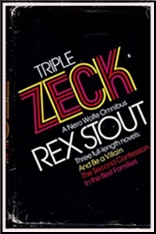
Just as Holmes had his Moriarty, and the 87th Precinct had its Deaf Man, so Nero Wolfe had… Arnold Zeck, who figured in three consecutive Rex Stout novels: And Be a Villain (1948), The Second Confession (1949), and In the Best Families (1950). Beginning with Full House (1955), Viking Press — his publisher for the last three decades of his life, and my future employer — assembled three books apiece into eight omnibus editions, five of which contained two novels and one of his collections (themselves generally comprising three novellas, occasionally two or four). All but one had poker-themed titles, the books seemingly selected at random, but the last bore the delicious moniker Triple Zeck (1974).
A little history: my high-school geometry teacher, whom I will forbear to name, did not excel at her job, but I owe her an incalculable debt, for it was she who — knowing I loved mysteries — lent me her Triple Zeck (I now have my own copy). So entranced was I with Wolfe and Archie that I proceeded to devour all 46 books, plus the spin-off Red Threads (1939), that year. Mind you, in 1981, I was also amidst other series: Lord Peter Wimsey (7 books), Tarzan (4), Barsoom (1), George Smiley (4), Horatio Hornblower (1), Mike Hammer (the only one not to stick; 1), and Len Deighton’s anonymous spy (1); hard to believe that at 18, I had so much time for reading … while falling in love with my wife!
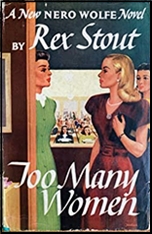
Backtracking a bit, the trilogy follows Too Many Women (1947), in which a disharmonic convergence of two virtually unthinkable events occurs the night the second victim, Kerr Naylor, is killed. First, Naylor loses Saul when he abruptly ducks into a taxi, and second, after Naylor takes it to Wolfe’s brownstone and, without leaving a name, asks for Archie, who is out for the evening, Fritz forgets to tell Archie upon his return.
“That Saul Panzer is the best tailer in New York. I don’t for a minute believe he lost Naylor! He don’t lose ’em! Even if he did, when Naylor came here, wouldn’t you have had him tailed when he left, since you were interested in him?,†bellows the understandably incredulous Cramer.
The curtain goes up on And Be a Villain (Hamlet, Act I, Scene V) as Wolfe — goaded into action by IRS payments — suggests that radio star Madeline Fraser hire him to investigate the poisoning of horse-race tipster Cyril Orchard on her show, in a sponsor’s product, yet.
Lina would pay only expenses, plus a deductible $20,000 if he nails the killer, to stop the bad publicity, although Tully Strong, secretary of the Sponsors’ Council, says the makers of Hi-Spot, the doctored beverage, might wish to do the hiring. It is decided that said fee will be split unequally among Hi-Spot; the network, the Federal Broadcasting Co. (FBC); Fraser; and other sponsors White Birch Soap and Sweeties: cue assembling the suspects.
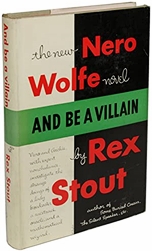
Refusing to work for Sweeties, Wolfe reassigns their 2% to the FBC and hosts Lina; her “stooge and feeder,†Bill Meadows, and manager, Deborah Koppel; script writer Elinor Vance; Nathan Traub, ad exec for the agency handling three sponsors; and Strong. Gate-crashing are Hi-Spot’s president and p.r. man, respectively Walter B. Anderson and Fred Owen, and FBC veep Beech.
Absent are Columbia mathematician F.O. Savarese, the ill-fated broadcast’s surviving guest, otherwise engaged, and Nancylee Shepherd, the “nosy little chatterbox†and “pain in the neck†who organized the country’s largest Fraser Girls’ Club, kept at arm’s length as much as possible, while being tolerated by Lina to a degree.
All deny remembering who’d uncapped the bottles, one containing cyanide — with which Fraser’s husband, Debby’s brother, allegedly killed himself six years earlier — and placed it in front of Orchard; it is unclear if he was a deliberate target. With Nan and her mother shipped off to the Ambassador in Atlantic City, impervious to Saul’s charms, Wolfe grills Savarese, an expert on probability who knew Orchard, and asked to join him on the show, to no end. Archie’s faked telegram from Al Shepherd lures his family to the brownstone, where Wolfe catches Nan lying, forcing her to admit that nearly a year ago, clear glasses were switched to opaque blue … and Lina’s bottles were always marked with Scotch tape.
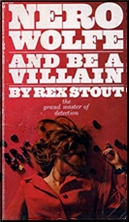
The inference is clear: Lina hasn’t been drinking Hi-Top, which gave her indigestion, a ruinous fact if revealed, and Bill says that Traub — naturally unaware of the substitution — unwittingly gave Orchard Lina’s poisoned coffee. Wolfe tells Cramer enough to have his army of men investigate who might have it in for Lina, and if his fact is deemed essential to catching the killer, he will collect that fee.
Even this seems fruitless until Beula Poole is shot dead in her office; she and Orchard published, for the unheard-of weekly price of $10, sheets giving, respectively, “inside advance information on political and economic affairs†and race-track tips, and Cramer reveals that both their offices were cleaned out.
Then, it happens: answering Wolfe’s ad seeking subscribers to What to Expect or Track Almanac is a voice “hard, slow, precise, and cold as last week’s corpseâ€; he has heard it before, with advice on a job for General Carpenter, and to advise him to limit his “efforts in behalf of a Mrs. Tremont,†which he did, but only “because no extension of them was required to finish the job I was hired for.â€
Zeck, who has a place in Westchester, is not pleased to learn that Wolfe knows his name — ascertained by Del Bascom’s agency with no word to Archie, whom he did not want to involve — and warns him to drop the matter. Cautioning Archie to forget his name and stay away from him, Wolfe drops a bombshell.
“I’ll tell you this. If ever, in the course of my business, I find that I am committed against him and must destroy him, I shall leave this house, find a place where I can work — and sleep and eat if there is time for it — and stay there until I have finished. I don’t want to do that, and therefore I hope I’ll never have to.â€
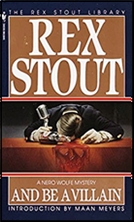
Then it’s back to the matter at hand, and he learns that said sheets were an ingenious blackmail racket. A disobedient Archie calls Lon Cohen at the Gazette — introduced in The Silent Speaker (1946) — to ask about Zeck, whom Lon has heard “owns twenty Assemblymen and six district leaders … if you print something about him that he resents your body is washed ashore at Montauk Point…â€
Comparing notes with Cramer, Wolfe posits that the éminence grise behind the sheets has “units†nationwide, ensuring success both with modest payments and by rigidly adhering to one-year “subscriptions†sans renewals. He suggests focusing on subscriber Vance — whose namesake is “Eleanor†in Shirley Jackson’s The Haunting of Hill House (1959) — and says one of Zeck’s cutouts may know the murderer’s identity.
He refuses a unilateral attempted firing by Anderson, who is enraged at associations with blackmail after Archie gives Lon the story (naming no names, natch) and withdraws his sponsorship; Wolfe also stirs the pot by faking an “anonymous†letter that implicates Elinor in a suspicious death.
At least that’s the plan, but as Archie waits for the interested parties to wind up a summit meeting to select the replacement for Hi-Top, Debby eats a sample of Meltettes candy, to disprove Nan’s assertion that “It’s dangerous!,†and promptly drops dead.
Unfortunately, when Archie refuses to be frisked like the others, Deputy Commissioner O’Hara (invoked yet unseen in Too Many Women) has him hauled downtown, where the forgery is found. He is sprung to forestall the release of an announcement sent to Fraser’s station, WPIT, that Wolfe “has solved the murder cases, all three of them, with no assistance from the police,†and can soon tell the D.A., so Cramer and Stebbins start rounding up suspects…
The blackmailers cleverly implied knowledge of fabricated dirty laundry but, by the law of averages, inevitably put the bite on someone who really had a deadly secret they would kill to protect. Lina faked Lawrence’s suicide and made herself seem to be the target, not Orchard; Anderson was scared off by Strong, who showed her the accusatory letters and deduced her guilt.
When Zeck calls to “congratulate you on keeping your investigation within the limits I prescribed,†and Wolfe responds, “I permit prescription of limits only by the requirements of the job. If that job had taken me across your path you would have found me there,†he says, “Then that is either my good fortune — or yours,†and hangs up.
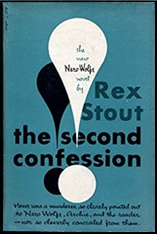
Act II, The Second Confession, opens as James U. Sperling, chairman of the board of the Continental Mines Corp., tries to hire Wolfe to do what Bascom has not: prove there is, and if possible get, evidence that layer Louis Rony is a Communist. He wants to prevent Rony, a “champion of the weak and downtrodden,†from marrying his younger daughter, Gwenn; Wolfe and Archie agree with her that communism is “intellectually contemptible and morally unsound.â€
Wolfe says, “Why not hire me to reach your objective, no matter how — of course within the bounds permitted to civilized man?,†but Del’s reports reveal that Rony was seen at Bischoff’s Pet Shop, “a branch of Zeck’s far-flung shenanigans…â€
“Andrew†Goodwin infiltrates to photograph Stony Acres, Sperling’s country home near Chappaqua, for a corporation portfolio and steal shots of Rony, at whom Connie Emerson is making a pass, while Archie fears that war widow Madeline may do so at him, tangling a possible diversionary run at sis Gwenn.
Also present are James, Jr., economist Webster Kane, and Connie’s husband, Continental-sponsored WPIT newscaster Paul, despised by Wolfe as a veritable fascist. Fiercely protective of Gwenn, Madeline recognizes “Andy†from a news photo and intuits that his object is Rony; offering him a ride back to the city, Archie plots for him to be knocked out in an ambush, simulated by Ruth Brady and Saul.
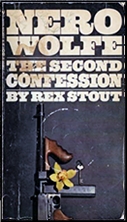
Rony carries an American Communist Party membership card for a “William Reynolds,†which Archie photographs, and eight keys, of which he takes impressions, giving Saul his cash to maintain the fiction. On his return, Wolfe is reporting a warning from Zeck to let Rony alone when the plant rooms are blasted with gunfire, leaving Theodore traumatized but unhurt.
Enlisting Andy Krasicki, Lewis Hewitt, and G.M. Hoag to salvage what they can, Wolfe is driven — literally and figuratively — to Westchester, where he enlightens the Sperlings regarding “X,†leaving Gwenn to decide if she insists on proof regarding Rony, whatever the cost; stalling for time, she makes a rendezvous to tell Rony they’re through.
The victim of an apparent hit and run, he’s found behind a bush by Archie, and Wolfe has Sperling, who rehires him to solve it, report the death, bringing local law Dykes, Noonan, and Archer — introduced, like Andy, in “Door to Death†(1949).
Archie deflects Archer’s interested in the faux holdup as best he can, while the antagonistic Noonan is thrilled that Wolfe’s car is found to have killed Rony, which Kane confesses he did by accident while borrowing it to mail some letters in Mount Kisco. Archer is satisfied, but not Wolfe, who refuses to consider Sperling’s $50,000 pay-off (including orchid-damage) final and, back home, receives the same amount in an anonymous package, obviously on behalf of Zeck.
He calls wishing luck to Wolfe, who asks Doc Vollmer to seek any sign on Rony of being knocked out before he was run over, with inconclusive results. He sends Archie and Saul with duplicate keys to his apartment, fruitlessly searched just when Jimmy and his mother turn up, looking ostensibly for letters from Gwenn, but presumably for a threat Rony held over them.
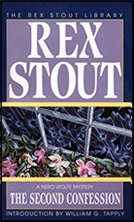
Telling the ’teers that any information will be used — or not used — at his sole discretion, he asks Saul and Orrie Cather to learn the hold, and Fred Durkin to probe their servants in an effort to glean who doped a drink meant for Rony yet consumed by Archie, who had done the very same thing, and switched them in the hope of searching his room.
Connie suspiciously materializes just as Archie locates a stone that — per Weinbach of the Fisher Laboratories, introduced in “Cordially Invited to Meet Death†(1942) — hit a man’s head. Saul learns that Jimmy contributed to the Committee of Progressive Business Men, a “funny front†for former Vice President, 1948 Progressive Party candidate, and alleged Communist “fellow traveler†Henry A. Wallace, his check one of several photostatted by a possible spy.
Wolfe is visited by Gwenn, who reports hearing an argument between the Emersons that implicated the jealous Paul, and “Mr. Jones,†a mysterious contact within the Communist party whom Archie has never met, and then has Archie call off the boys.
Deducing that Reynolds is not Rony’s alias but the killer’s, Wolfe ghost-writes articles on the party’s inner workings (leaked by Jones) for Lon, now second in command at the city desk; his anonymous letter fingering Reynolds as their source leads high-ranking Harvey and Stevens — one of whom may be Jones — to sign a document identifying his photo.
At the climactic confab, Wolfe forces Web to retract his first confession, only to reveal he is Reynolds, his stunned look the titular admission. In what Archie calls “the tail,†Sperling repays Wolfe by pulling Paul off the air, where he’d insulted Wolfe, and a satisfied Zeck sends him $15,000, replacing what he’d paid Jones, all set aside by Wolfe as a war chest.
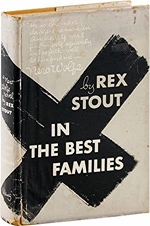
Wolfe finally makes good on his vow in Act III, In the Best Families, which begins when wealthy Sarah Rackham visits with cousin Calvin Leeds and hires him to learn the source of second husband Barry’s new income. As cover, Archie is to be called in on a valuable dog’s poisoning at Calvin’s Hillside Kennels, and invited with him to dine at her adjacent Westchester estate, Birchvale.
That morning, Wolfe is expecting a sausage delivery from Bill Darst that he and Fritz plan to share with Marko Vukcic, but the box instead contains a cylinder of tear gas, a warning from Zeck to lay off Barry, suggesting an answer to Mrs. Rackham’s question; Wolfe hangs up when Zeck offers to replace her $10,000 with cash.
“This episode will be repeated. [The telephone] will ring, and that confounded voice will presume to dictate to us. If we obey the dictate we will be maintaining this office and our means of livelihood only by his sufferance. If we defy it we shall be constantly in a state of trepidant vigilance, and one or both us us will probably get killed.â€
Wolfe refuses to ignore the third threat, as does Archie, who advises that the household begin the “trepidant vigilance†and heads off to Westchester, casing Eastcrest, Zeck’s mansion. At dinner are Sarah’s widowed daughter-in-law, Annabel Frey; banker, Dana Hammond, her admirer; and secretary, Lina Darrow, as well as her admirer, state assemblyman Oliver A. Pierce.
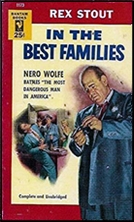
That night, Nobby, a Doberman pinscher given to Sarah by Calvin, crawls to Hillside and dies with a steak knife stuck in him; his mother, Hebe, gets the scent, leading Calvin and Archie toward Birchvale, but on the path is Sarah, stabbed with the same knife. Archie is candid with Archer, if omitting Zeck, and Leeds says, “It happens in the best of families†before he races home, where Wolfe has bolted, leaving three notes. Two offer Theodore and Fritz employment with Hewitt (who takes the plants) and Marko, respectively, while one reads, “A.G.: Do not look for me. My very best regards and wishes,†and a Gazette ad announces his retirement, referring only clients having “unfinished matters†to Archie.
Marko reveals that Wolfe has given him a power of attorney, told him “to offer the house and its contents for sale [with] confidential instructions,†and bidden Archie “to act in the light of experience as guided by intelligence.†New millionaire Barry contradicts Archie, claiming that Sarah was going to consult Wolfe about possible mishandling by Hammond of her affairs, and disbelieving Archie’s ignorance of Wolfe’s whereabouts, Archer locks him up.
Before Wolfe’s lawyer, Nathaniel Parker (mentioned, by surname, in The Silent Speaker), springs him, Archie is offered a job in the “organization†by his cellmate, Max Christy, who per Lon sets up “little weekend roundups … Anything men risk money for.â€
Bequests also go to distant relatives, servants, Lina ($200,000), Annabel (Birchvale plus $1 million), and Leeds ($500,000), whose corroboration of Archie is disbelieved as well; like him and everyone else, Cramer thinks Archie knows how to reach Wolfe but, having deduced the truth, he says Wolfe should return Sarah’s fee and Zeck “is out of his reach.â€
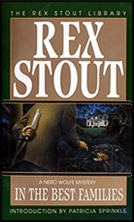
Archie decides to open his own office at 1019 Madison Avenue, with Annabel as his first client, who asks him to a gathering of the suspects … none of whom will cooperate. Max invites Archie to meet a man he thinks might be Zeck, but it is bearded Pete Roeder from L.A., who wants Archie to tail Barry and has his driver, Bill, take them up to 1019 to talk.
There, he is revealed as Wolfe, who’d spent “the most painful month of my life — except one, long ago,†in Texas, and has lost 117 pounds. Like Charles Forbin in D.F. Jones’s Colossus (1966), he knows his only guarantee of privacy is to feign the need for female companionship, so Lily Rowan hosts a five-hour confab in her E. 63rd Street penthouse, necking with “Pete†en route to sell it.
Having planted a seed of suspicion in Zeck, Pete has Archie hire the ’teers for the job, deliberately letting themselves be spotted, and when confronted by Barry, Archie accepts $6,000 to reveal that they are working — indirectly — for Zeck, whom he conjectures “is getting set to frame you for the murder of your wife.â€
Archie claims to have told Barry he was working for Annabel in his daily reports to Max, who takes him to an audience where Zeck denies seeking Wolfe, but tries to recruit him; with the threat of a murder rap, he wants to force Barry to help them duplicate Roeder’s successful L.A. operation locally.
Summoned to Archer’s office, Archie encounters Lina (a name Stout, typically casual, used for two characters in the trilogy), jilted by Barry and peddling the tale of a fictitious whistle-blowing call from Wolfe to Sarah that gave him a motive. “About all that [his] ticket to the electric chair needed was my endorsement,†yet however deserved, it would end the anti-Zeck scheme, so he shoots the story full of holes.
Persuaded that his only out is an accommodation, Barry is taken to Zeck by Archie — now nominally on the payroll — and Pete, with a gun beneath his briefcase’s false bottom, used to cover Barry when they abruptly bind and gag Zeck. He agrees to trade evidence Wolfe has assembled against him for evidence that will convict Barry, who grabs the gun Archie “carelessly†put down to free Zeck, kills him, and in turn is killed by henchmen.
Back in the brownstone at last, Wolfe earns Sarah’s fee by revealing that Calvin tipped off Zeck, and only he would be trusted by Nobby enough to stab him after killing his new mistress; vacationing with Lily in Norway, Archie learns that Leeds has hanged himself in his cell.
The only book in the trilogy to be adapted, “In the Best Families†(3/6/81) was directed for the William Conrad series — which, oddly enough, I was not watching while reading the books during its original January 16-June 2 run — by the prolific George McCowan and, like “Before I Die†(1/30/81), scripted by Alfred Hayes.
I hope you’ll agree that to summarize the first two in detail gave the third an essential context! Guest stars Linden Chiles (Leeds), Burr DeBenning (Max), and Diana Douglas (Sarah) each made multiple appearances with Conrad on Cannon; DeBenning, the ill-fated scientist in The Incredible Melting Man (1977), was also later seen on Matt Houston opposite Lee Horsley (Archie).
Even before Sarah and Leeds arrive, a messenger (Chuck Tamburro) delivers the fateful package from Arnold Dorso (Robert Loggia), “king of the spiders,†who knows Wolfe is out to change his untouchability. Defying this third warning, Wolf takes the job; Hayes excises several characters, but otherwise follows Stout closely with the Westchester trip, the introduction of Annabel (Juanin Clay) and Barry (Lawrence Casey), and the murder.
Once again, Archie returns home to find the door wide open as Fritz (George Voskovec) and Theodore (Robert Coote) wait with the notes, yet no sooner has he been summoned to Rusterman’s than Marko (Alex Rodine) takes him to Wolfe, hiding in the meat locker.
The spectacle of a chipper Wolfe in chef’s garb, singing opera, is a far cry from the folds of skin bespeaking “Pete’s†crash diet, and if he truly sought to disappear, hiding out with his oldest friend seems less than secure. It’s as if Hayes said, “Let’s adapt Gone with the Wind, but leave out all that nonsense about the Civil Warâ€; why, with 46 to choose from, select and then vitiate the book whose distinguishing characteristic is Wolfe’s imposture?
Archie rejects an offer from Annabel, who believes Barry is guilty, but accepts one from Max (now a Christy/Roeder amalgam), ostensibly bitter over his abandonment by Wolfe, whose dispute with Marko’s chef over seasoning is interpolated as supposed comic relief.
The rest of the plot, and even the dialogue, remain faithful, with Archie flying solo in the climactic confrontation, and Annabel assuming some of Lina’s functions, just as Max did Pete’s. When the normally unsentimental Wolfe hands Leeds over to D.A. Emory (Arnie Moore) and his assistant (David M. Zellitti), his outrage over Nobby’s betrayal is true to Stout; in a lame tag, Archie refuses a delivery from another messenger (Bennett Roberts). Loggia’s toymaker in Big (1988) was a change of pace from crime stories, e.g., Scarface (1983), Prizzi’s Honor, Jagged Edge (both 1985) — earning Loggia an Oscar nomination as Best Supporting Actor — Innocent Blood (1992), Lost Highway (1997), The Sopranos.
— Copyright © 2023 by Matthew R. Bradley.
Up next: “Disguise for Murderâ€
Editions cited:
Too Many Women: Bantam (1955)
And Be a Villain, The Second Confession, In the Best Families in Triple Zeck: Viking (1974)
Online source:
May 9th, 2023 at 10:34 am
An apt post (if coincidentally) for Teacher Appreciation Week!
May 9th, 2023 at 12:34 pm
Confession time. The Zeck stories were among my least favorite Wolfe novels at the time I read them. I was very young, and that was a long time ago. They don’t even sound familiar now.
I’ll have to read them again! (I’m sure I still have the same 3-in-1 volume you have, Matthew.)
PS. Hurray for teachers!!
May 9th, 2023 at 4:04 pm
Wow, that’s funny—to me they’re the absolute pinnacle of the series. Vive la difference!
May 9th, 2023 at 4:05 pm
And it’s worth noting, with no offense intended, that even if she’d made me a whiz at geometry, it would have had far less effect on my future than instilling a love of Wolfe did. Food for thought…
May 9th, 2023 at 6:52 pm
The best of the Zeck adaptation was Loggia in the role, though it strayed closer to Stout in spirit than some of the episodes that were closer in word but otherwise seemed to miss the point as was so often true of the series.
As usual thanks again for this series. A deep dive into the Wolfe series, even only those adapted for the screen, is certainly needed.
May 11th, 2023 at 9:23 am
Thanks, David. And at least I do a “shallow dive” on the non-adapted works along the way! Agree that Loggia, always welcome, was an asset. In fairness, if you set aside the considerable streamlining, it was in many ways extremely faithful to the novel.
May 19th, 2023 at 9:21 am
Some fun history, below. See link. This true-life news story is related to the Nero Wolfe yarn, ‘Too Many Detectives’.
It is this incident upon which that story was presumably based?
https://spectrum.ieee.org/illegal-wiretapping
(I’m only posting here, because I can’t find ‘Too Many Detectives’ yet reviewed in any of the other Stout discussions. I did search for it, I assure you…)
May 20th, 2023 at 9:07 am
Fascinating! Thanks, Lazy. Yes, I have 10 books to go before I get to Three for the Chair, which contains “Too Many Detectives,” published in Collier’s (one of only two stories to appear there) on September 14, 1956, hard on the heels of the case discussed. It does not appear to have been adapted for the screen.
May 20th, 2023 at 7:38 pm
I like how the judge in that case went out of his way when he delivered the court’s verdict.
He’s like, “Ordinarily, I never pass comment on anyone I sentence. But seriously, you guys are utter slime”
Zing! Love it.